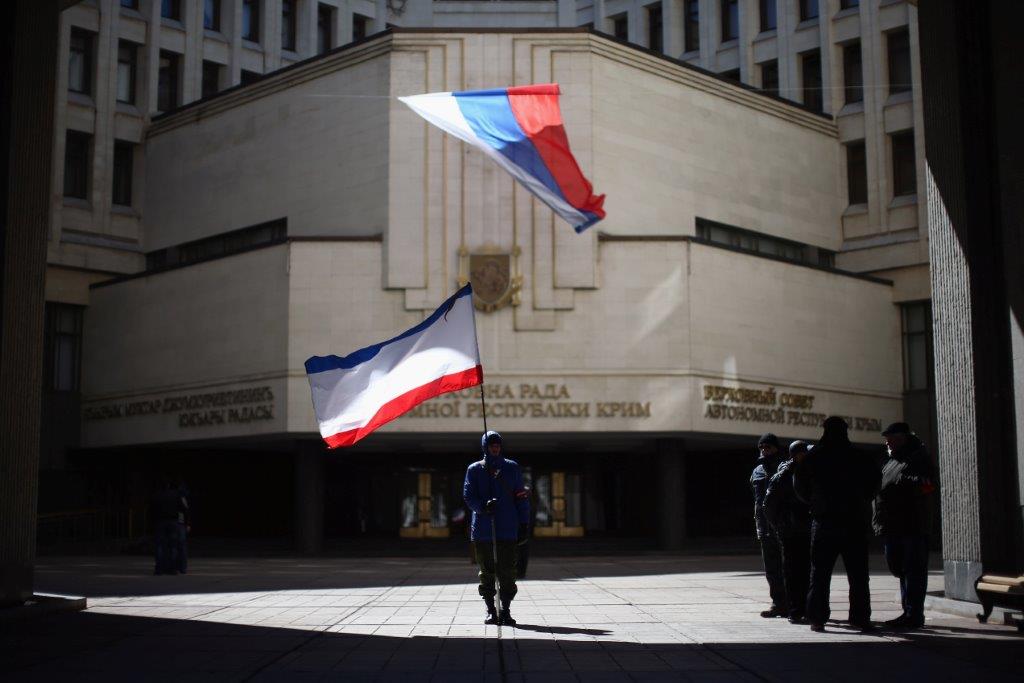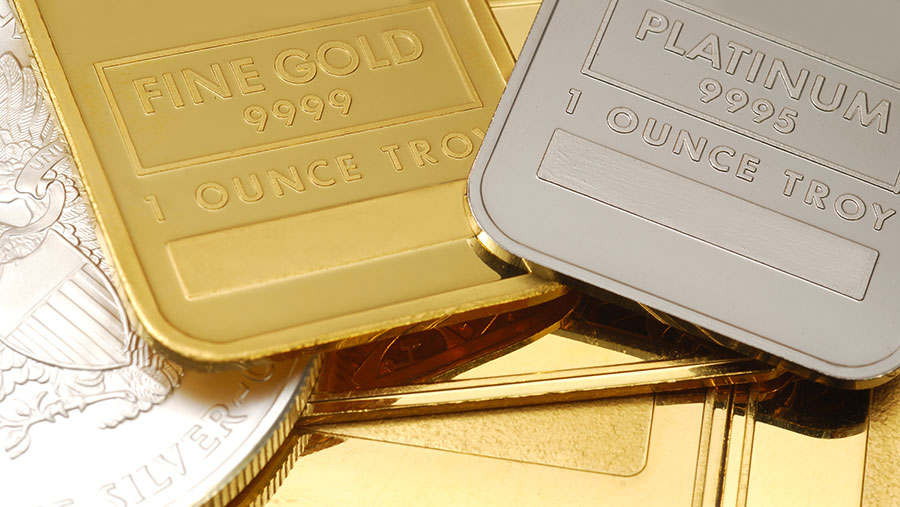Personal Wealth Management /
Don’t Go Russian to Conclusions About Sanctions
The US and EU slapped sanctions on Russia after Crimea voted to rejoin the Motherland, but so far, the economic impact appears minimal.
Following a referendum Sunday, it seems the Crimean regional and Russian flags are poised to fly together officially. Dan Kitwood/Getty Images
Crimea held its referendum on flipping from Ukraine to Russia Sunday, and in a feat of intimidation and propaganda that only a thuggish dictator could orchestrate, the pro-Russians carried 96.7% of the vote. Moscow gleefully welcomed its new subjects ... err, comrades ... with open arms, while the US and EU immediately denounced the results, calling them violations of Ukraine’s sovereignty and international law. On Monday, both followed finger-wagging with sanctions. Headlines now warn of economic war between Russia and the West, with dire consequences for businesses on both sides. In our view, that’s a touch hyperbolic when you scale the numbers involved, though there would certainly be some economic impact. However, the likelihood it comes to that is practically nil—the global economy and markets shouldn’t feel much (if any) pinch from sanctions.
As for the referendum itself, market impact was muted—the outcome was never in doubt. Most ethnic Crimean Tatars boycotted the poll, ethnic Russians make up the majority of Crimea’s population, and official campaign posters equated Ukrainian rule with Nazism and Russian with red, white and blue. Campaign officials bragged about the lack of dissent—to them, a sign of a free and fair election, though we rather suspect it had more to do with the armed trucks and gun-toting soldiers patrolling the streets. But, importantly, no shots were fired—perhaps markets realize if Vladimir Putin can annex another country without bloodshed, actual armed conflict is exceedingly unlikely.
Economic conflict, however, might be another matter. These initial sanctions don’t bite: The US slapped seven allegedly prominent Kremlin aides with visa bans and asset freezes, and the EU hit 13 unnamed but supposedly important Russians with the same. Oligarchs and Putin himself were spared. Neither side erected trade or capital restrictions—businesses can continue investing as normal. It’s even unclear how hard these sanctions will hit their actual targets. The US and EU have warned of sanctions for weeks, and their prospective targets weren’t actually secret. These individuals had plenty of time to move their assets offshore, which might have something to do with foreign assets custodied at the Fed falling a record $105 billion last week.
For now, Russian firms don’t appear to be worried about a broader hit. Russia’s state-run energy oligopoly Rosneft, for example, announced Monday it’s buying a 50% stake in an Italian holding company—not what you do if you’re expecting business interests in the EU to be blocked or seized. In our view, that seems something of a fair bet. EU businesses are heavily lobbying German Chancellor Angela Merkel—self-appointed point person for EU-Russo economic relations—to keep measures to a minimum. German businesses had about $22 billion in accumulated Russian investments through September 2013, and they don’t want Putin to whack them with retaliatory measures. The EU still gets about one-third of its oil, coal and natural gas from the Motherland, and no one wants Putin turning off the lights. Merkel has already called broader sanctions a “last resort.”
However, the EU’s statement says, “Any further steps by the Russian Federation to destabilize the situation in Ukraine would lead to additional and far-reaching consequences for relations in a broad range of economic areas.” Recent reports suggest Russian boots are already on the ground in Ukraine proper. So it’s entirely possible more sanctions follow—and possible Putin could retaliate. Unlikely that it erupts into a full-blown trade war, but possible. Yet, bad as a trade war sounds, neither the US or EU depend heavily on Russian trade. Nor does the global economy.
A full trade war would hit Russia most of all. 57.4% of Russia’s exports go to the EU and another 2.9% to the US. The EU comprises 46.8% of Russia’s imports and the US 5.6%. Russia’s losses wouldn’t ripple much globally—the country is only 2.8% of global GDP—but they’d hurt like heck at home. On the western front, the fallout would be much smaller. Trade between US and Russia totaled $38.1 billion last year—about 0.76% of total US trade and 0.23% of US GDP. Russo-German trade ties are more significant—bilateral trade totaled €76.5 billion last year, about 4% of total German trade and 2.8% of German GDP. Losing this, though unlikely, would be a negative for Germany, but it would shave less than 0.2% off global GDP—easily offset by growth elsewhere.
Most hurt would be Eastern European and Baltic states. Russia typically comprises between 3% and 6% of Polish exports and between 11% and 15% of Polish imports each month (spotty data availability make a full-year calculation impossible). Per the CIA, 12.7% of Estonia’s exports went to Russia in 2012, and 4.1% of Estonian imports were Russian. 9.6% of Latvian and 31.6% of Lithuanian imports came from Russia; 18.2% of Latvian and 19% of Lithuanian exports went to their former Soviet master. But here, too, the total amounts to a fraction of global GDP, and the global economy is ultimately what matters most for stocks.
Still, cutting trade ties would do some heavy damage to these former Soviet satellites—but that’s another reason sweeping sanctions are likely unpalatable for Brussels. Latvia, Lithuania and Estonia are EU success stories—evidence that Western capitalism can bring growth and wealth to places turned desolate under Soviet oppression. Latvia and Estonia have worked their way back from bailouts during the financial crisis and are poster children for the eurozone’s austerity drive—the shining example Greece and Portugal were encouraged to look to in 2011 and 2012. Lithuania aims to become the 19th euro member in 2015. Keeping all healthy and growing is not only for EU bragging rights, but to keep the nations tilting firmly west—the more they gain from EU and euro membership, the more resistant they’ll be if the Cossacks come knocking. If they’re collateral damage in EU-Russian sanctions, and the EU is seen firing the first shot, Putin has that much more of an in.
Overall, a full-blown trade war between the West and Russia seems exceedingly unlikely. There is no way to say where and when this situation de-escalates, and more sanctions are possible. But absent a huge, military escalation, ultimately the global economic and market impact should be minimal.
If you would like to contact the editors responsible for this article, please message MarketMinder directly.
*The content contained in this article represents only the opinions and viewpoints of the Fisher Investments editorial staff.
Get a weekly roundup of our market insights
Sign up for our weekly e-mail newsletter.

You Imagine Your Future. We Help You Get There.
Are you ready to start your journey to a better financial future?

Where Might the Market Go Next?
Confidently tackle the market’s ups and downs with independent research and analysis that tells you where we think stocks are headed—and why.






